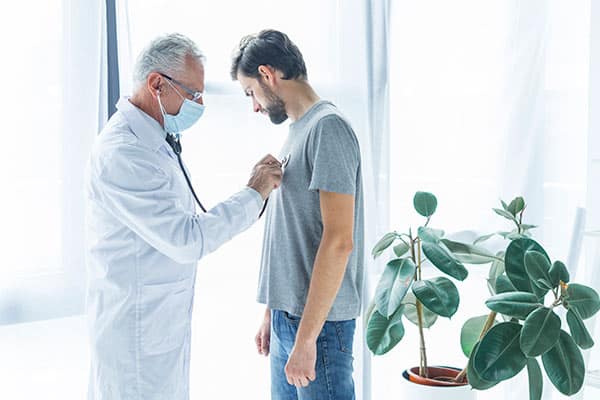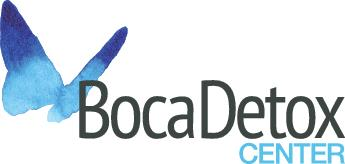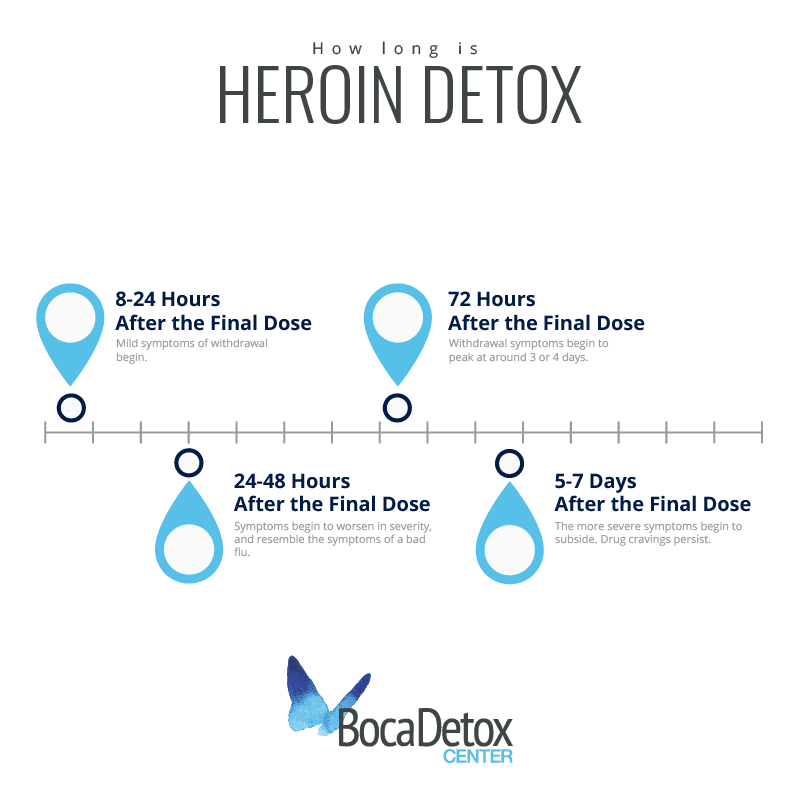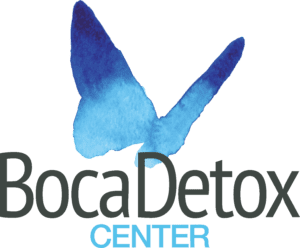Medically Assisted Heroin Detox
at Boca Detox Center
at Boca Detox Center
The initial step on every journey of addiction recovery is admission to a medically assisted detoxification center. Those who have been abusing drugs or alcohol for any period of time almost always undergo some degree of withdrawal upon abrupt cessation of use. More often than not, the symptoms of heroin withdrawal will lead a person back to substance use before the detoxification process is over. While these symptoms are not typically life-threatening, they can be extremely uncomfortable when left untreated. This is part of the reason why entering into an inpatient heroin detox program is so important.
At Boca Detox we provide a comprehensive detox program; one that focuses on more than a safe, pain-free drug and alcohol withdrawal. In addition to providing around the clock medical care, we actively prepare our clients for the next appropriate stage of their personal recovery journeys. During heroin detox, we conduct an individualized, in-depth evaluation, which helps us determine the length of our clients stay, what kind of medical intervention is necessary, and the next step for each client once they become physically stabilized.
The Boca Detox Center Method: Heroin Detox
If you or someone close to you has been struggling with heroin addiction, Boca Detox is available to help. Our recovery method is unique in the sense that it focuses on the individual; no two people have the same experience with active addiction, therefore no two detox treatment plans should be identical. If you have been battling heroin you are certainly not alone and recovery is always possible, no matter how severe a heroin use disorder has become.
At Boca Detox, we treat psychological, physical and emotional withdrawal symptoms simultaneously, making for an integrated and effective detox experience quite unlike any other. We specialize in treating people who have been through detox beforehand, but have not managed to stay sober for an extended period of time afterwards. Our program of clinical care is truly unmatched, and cannot be found in any state-run facility or traditional hospital setting.
What is Heroin Addiction?
According to the Centers for Disease Control and Prevention, heroin is an addictive and illegal opioid narcotic – one that often leads to serious health-related complications, including overdose and overdose-related death. Heroin is derived from morphine, a naturally occurring opiate, and reduced to a brown or white powder or a dark, sticky substance known as “black tar.” In most cases, individuals who use heroin will either snort or inject the substance. However, over the course of the past several years, intravenous heroin abuse has been on the rise countrywide. Once heroin is ingested (by any means) it rapidly enters the brain, and binds to opioid receptors on cells throughout the body. These cells regulate feelings of pain and pleasure and control numerous bodily functions including sleep, heart rate and breathing.
Over the course of the past several years, heroin abuse and addiction have become major health-related concerns throughout the United States. The National Institute on Drug Abuse reported that in the year 2017 alone, roughly 948,000 Americans admitted to using heroin. The same report concluded that the number of people meeting the Diagnostic and Statistical Manual of Mental Disorders, 4th edition (DSM-IV) criteria for heroin dependence during 2016 was roughly 626,000. This number had increased from 214,000 in 2002. Heroin abuse and dependence is most common amongst 18 to 25 year olds. From 2008 to 2012, treatment admissions for heroin abuse among men and women in this age group increased from 11 percent to 26 percent.
We Are Here For You
Let Us Help You Heal
Our detoxification experience is second to none.
Learn how we can help by speaking with one of our Treatment Advisors today.
Signs of Heroin Use & Dependence
If you believe you or someone you love has been suffering from a diagnosable heroin use disorder, there are several signs and symptoms to keep an eye out for. The Diagnostic and Statistical Manual of Mental Disorders, Fifth Edition (DSM-V) outlines a list of diagnostic criteria used to identify the presence of an opioid use disorder. If you answer “yes” to two or more of the following questions, seeking professional help from a medical detox center is likely a good idea.
- Do you sometimes end up using a higher dose of heroin than you originally intended, or do you use heroin more frequently than you intend to?
- Have you wanted to cut back on your dose or quit entirely, only to find you were unable to do so for any significant period of time?
- Do you spend a significant amount of time obtaining heroin, using heroin and recovering from its effects?
- Do you often think of using heroin/do you ever experience intense cravings?
- Has your drug use interfered with your ability to fulfill personal obligations or negatively impacted your performance at work or at school?
- Have you experienced interpersonal problems as a direct result of your heroin use?
- Have you given up activities which were once interesting or important to you in order to engage in heroin use?
- Have you been engaging in risk-taking activities more often than normal, like driving while under the influence of heroin or combining heroin with other substances like alcohol or benzodiazepines?
- Do you continue to use heroin despite physical or psychological health concerns directly related to the drug?
- Have you developed a physical tolerance, meaning a higher dose is required in order for the desired effects to be achieved?
- Do you experience withdrawal symptoms when heroin use is stopped abruptly?
Our Detox Services Include
Signs & Symptoms of Heroin Withdrawal
The symptoms associated with heroin detox can be extremely uncomfortable, but symptoms of opioid withdrawal rarely lead to life-threatening complications. Most people who undergo Norco withdrawal liken the symptoms to those of a particularly bad flu or cold.

Physical & Psychological Symptoms of Heroin Withdrawal
The Physical Symptoms of Heroin Withdrawal
The most common physical symptoms associated with heroin withdrawal include:
- Muscle aches and pains
- Stomach cramping
- Nausea and vomiting
- Flu-like symptoms, including watery eyes, runny nose, night sweats and chills
- Excessive yawning
- Restlessness/an inability to sit still
The Psychological Symptoms of Heroin Withdrawal
The most common psychological symptoms associated with heroin withdrawal include:
- Anxiety and panic attacks
- Depressed mood
- Suicidal ideation
- Intense drug cravings
If you believe that your loved one is suffering at the hands of a heroin abuse disorder, contact Boca Detox today. The first step on every road to long-term heroin addiction recovery is medically monitored detox. While the symptoms of withdrawal are not generally life-threatening, they can be so physically uncomfortable that they lead an individual back to heroin use before the detox process has even concluded.
Ready To Begin Your Detox?
We Offer A Safe & Effective Program
Don’t let addiction control your life.
Call us today and let’s get you started on the path to a better you.
Heroin Withdrawal Timeline & What to Expect
The duration of your personal heroin withdrawal experience depends heavily on the severity of your substance use disorder. In most cases, heroin withdrawal lasts for between one and two weeks, The symptoms associated with heroin withdrawal are broken down into two categories — early withdrawal and late withdrawal.
Early Stage Heroin Withdrawal
- Agitation and irritability
- Mild to moderate anxiety
- Runny nose
- Profuse sweating
- Mild to moderate muscle aches and pains
- Stomach cramping
- Yawning and watery eyes
- Insomnia
The late stages of heroin withdrawal will take hold around 12 hours after the final use, and will last for up to two weeks. However, if these symptoms are adequately treated in a medical detox facility, they will be resolved far more quickly.
Late Stage Heroin Withdrawal
- Severe abdominal cramping
- Nausea, vomiting and diarrhea
- Intense headaches
- Severe anxiety, sometimes marked by panic attacks
- Cold sweats, uncontrollable shaking and body tremors
- Insomnia and other sleep-related issues
- Severe depression, which can lead to suicidal ideation
- General feelings of restlessness and discomfort
These symptoms can be uncomfortable, but heroin withdrawal does not have to be a painful and unpleasant experience. At Boca Detox we are dedicated to providing our clients with a completely pain-free detox. Not only was our homestyle retreat designed with client comfort in mind, but our team of compassionate professionals works together to ensure that each individual client is receiving the quality clinical care that he or she both needs and undeniably deserves.
Are Heroin Withdrawals Fatal?
Generally speaking, the symptoms associated with heroin withdrawal are not dangerous and can be effectively managed. However, it is always a good idea to enter into an inpatient detox program — even if your opioid use disorder was short-lived and you believe you can manage symptoms on your own. This is partially because the drug cravings that go hand in hand with opioid withdrawal can be so severe. In some cases, a person might attempt to detox at home and return to use in order to combat the cravings, but they might accidentally take more of the drug than their body can handle, leading to a life-threatening overdose. At Boca Detox we provide our clients with the medication they need to successfully avoid severe cravings and the structured environment they need to avoid relapse.
Steps of the Heroin Detox Process
The process will look different for everyone, though it will always begin with a thorough addiction assessment. This assessment helps our clinical and medical team determine which detox methods are going to be the most effective for each unique case. Once the assessment is complete, you will be shown to your private or semi-private bedroom and given a tour of the rest of the center. During your stay in inpatient detox an individualized aftercare plan will be developed, which typically includes an immediate transition into a higher level of clinical care like inpatient rehab, partial hospitalization or intensive outpatient treatment.

Heroin Withdrawal Timeline & What to Expect
The duration of the opioid withdrawal process depends heavily on how severe the opioid use disorder was, the presence of any underlying medical conditions and whether or not the opioid was being combined with any other chemical substance. In most cases, a standard opioid detox timeline looks like:
- 8-24 hours after the final dose – Mild symptoms of withdrawal begin. These include general feelings of physical discomfort, restlessness, headaches, loss of appetite and drug cravings.
- 24-48 hours after the final dose – Symptoms begin to worsen in severity. In many cases, symptoms resemble the symptoms of a bad flu or cold.
- 72 hours after the final dose – Withdrawal symptoms begin to peak at around 3 or 4 days. These symptoms might include nausea, vomiting and diarrhea, severe stomach cramping, body aches and pains, restlessness, irritability and insomnia.
- 5-7 days after the final dose – The more severe symptoms begin to subside. Drug cravings often persist, along with some psychological symptoms like anxiety, depressed mood and/or insomnia.
How Will Boca Detox Center Treat My Heroin Detox Symptoms?
How are the symptoms of heroin withdrawal treated? In the vast majority of cases, the symptoms of withdrawal can be effectively treated with a combination of over-the-counter medication, bed rest and adequate sleep/nutrition. However, in some cases, more intensive measures are required. At Boca Detox, you have access to the following treatment options:
- Medication Assisted Treatment (MAT).
- Individual, Group and Family Therapy Sessions.
- Relapse Prevention Training.
- Professional Psychiatric Care.
- Case Management Services.
Will I Receive Detox Medications? How Will They Help?
Medication Assisted Treatment (MAT) is only utilized when deemed absolutely necessary by the medical team. Because active addiction affects everyone differently, the detox process will not look identical for any two clients. The right treatment options for you are determined upon your arrival.
Medications Used for Opioid Withdrawal
If symptoms of opioid withdrawal are particularly severe, the following medications might be prescribed:
- Clonidine. This medication can help alleviate nausea and vomiting.
- Buprenorphine. This medication helps alleviate the more severe symptoms of opioid withdrawal while reducing drug cravings.
- Over-the-counter pain relievers. Medications like acetaminophen and ibuprofen might be used to treat symptoms like headaches, low-grade fever and general feelings of physical discomfort.
- Non-addictive sleep aids. If a client is struggling with insomnia, a safe and non-narcotic sleep aid might be prescribed.
Heroin Addiction Recovery Statistics & Outlook
Medical detox will always be necessary to treat the symptoms of opiate withdrawal. At Boca Detox we utilize numerous proven and effective detoxification methods, including Medication Assisted Treatment (MAT) and tapering. Our team of medical professionals is composed of a combination of addiction specialists, prescribing physicians, and licensed therapists and psychiatrists. We provide quality clinical care in a homestyle retreat, which was carefully designed with client comfort in mind. We understand that committing to recovery can be scary, and that the anticipation of undergoing opiate withdrawal is generally much worse than the withdrawal process itself. Rest assured that you are in good hands, and our staff members all work together to make the process pain-free and efficient.
Begin Healing Now!
Have A Call With One Of Our Treatment Advisors
Don’t Suffer Any Longer
Contact Us Today to Learn More
The symptoms associated with heroin withdrawal can be extremely uncomfortable when left untreated. It is important to seek the care of a team of experienced medical professionals before associated symptoms peak in severity. At Boca Detox we effectively treat the symptoms associated with opioid withdrawal while providing our clients with the tools they need to continue along on their personal journeys of addiction recovery. Getting started is as simple as reaching out for help. Once you make initial contact, either through our website or over the phone, you are put in touch with one of our experienced Treatment Advisors who will answer any additional questions and walk you through our simple admissions process. We begin by conducting a brief pre-assessment, which helps our medical team determine which detox methods are the best fit for you. We offer a free, no obligation insurance benefit check and arrange local transportation to our Boca, Florida detox center. All you have to do is reach out for help, and we will take care of the rest.

















